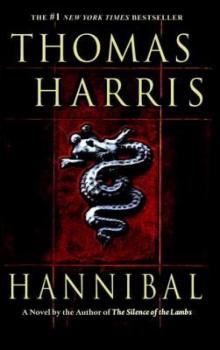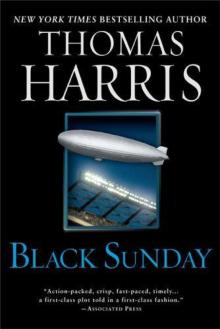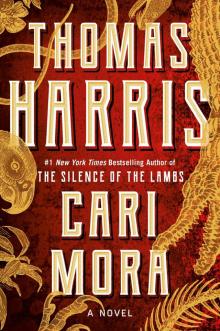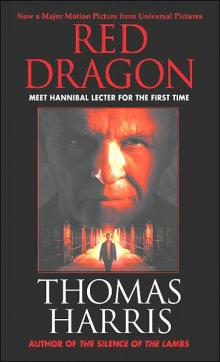- Home
- Thomas Harris
Hannibal Page 17
Hannibal Read online
Page 17
Dr. Lecter sometimes entertained the illusion that he could smell with his hands, his arms and cheeks, that odor suffused him. That he could smell with his face and his heart.
For good, anatomic reasons, scent fosters memory more readily than any other sense.
Here Dr. Lecter had fragments and flashes of memory as he stood beneath the soft light of the Farmacia’s great Art Deco lamps, breathing, breathing. Here there was nothing from jail. Except—what was that? Clarice Starling, why? Not the l’Air du Temps he caught when she opened her handbag close to the bars of his cage in the asylum. That was not it. Such perfumes were not sold here in the Farmacia. Nor was it her skin lotion. Ah. Sapone di mandorle. The Farmacia’s famous almond soap. Where had he smelled it? Memphis, when she stood outside his cell, when he briefly touched her finger shortly before his escape. Starling, then. Clean, and rich in textures. Cotton sun-dried and ironed. Clarice Starling, then. Engaging and toothsome. Tedious in her earnestness and absurd in her principles. Quick in her mother wit. Ummmm.
On the other hand, bad memories for Dr. Lecter were associated with unpleasant odors, and here in the Farmacia he was perhaps as far as he ever got from the rank black oubliettes beneath his memory palace.
Contrary to his usual practice, Dr. Lecter bought quite a lot of soaps and lotions and bath oils on this gray Friday. A few he took with him, and he had the Farmacia ship the rest, making out the shipping labels himself in his distinctive copperplate hand.
“Would the Dottore like to include a note?” the clerk asked.
“Why not?” Dr. Lecter replied, and slipped the folded drawing of the griffon into the box.
The Farmacia di Santa Maria Novella is attached to a convent in the Via Scala and Carlo, ever devout, removed his hat to lurk beneath an image of the Virgin near the entrance. He had noticed that air pressure from the foyer’s inner doors made the exterior doors puff ajar seconds before anyone comes out. This gave him time to conceal himself and peep from hiding each time a customer left.
When Dr. Lecter came out with his slim portfolio, Carlo was well concealed behind a card vendor’s stall. The doctor started on his way. As he passed the image of the Virgin, his head came up, his nostrils flared as he looked up at the statue and tested the air.
Carlo thought it might be a gesture of devotion. He wondered if Dr. Lecter was religious, as crazy men often are. Perhaps he could make the doctor curse God at the end—that might please Mason. He’d have to send the pious Tommaso out of earshot first, of course.
__________
Rinaldo Pazzi in the late afternoon wrote a letter to his wife including his effort at a sonnet, composed early in their courtship, which he had been too shy to give her at the time. He enclosed the codes required to claim the escrowed money in Switzerland, along with a letter for her to mail to Mason if he tried to renege. He put the letter where she would only find it if she were gathering his effects.
At six o’clock, he rode his little motorino to the Museo Bardini and chained it to an iron railing where the last students of the day were claiming their bicycles. He saw the white van with ambulance markings parked near the museum and guessed it might be Carlo’s. Two men were sitting in the van. When Pazzi turned his back, he felt their eyes on him.
He had plenty of time. The streetlights were already on and he walked slowly toward the river through the black useful shadows under the museum’s trees. Crossing over the Ponte alle Grazie, he stared down for a time at the slow-moving Arno and thought the last long thoughts he would have time to entertain. The night would be dark. Good. Low clouds rushed eastward over Florence, just brushing the cruel spike on the Palazzo Vecchio, and the rising breeze swirled the grit and powdered pigeon droppings in the piazza before Santa Croce, where Pazzi now made his way, his pockets heavy with a .380 Beretta, a flat leather sap and a knife to plant on Dr. Lecter in case it was necessary to kill him at once.
The church of Santa Croce closes at 6:00 P.M., but a sexton let Pazzi in a small door near the front of the church. He did not want to ask the man if “Dr. Fell” was working, so he went carefully to see. Candles burning at the altars along the walls gave him enough light. He walked the great length of the church until he could see down the right arm of the cruciform church. It was hard to see, past the votive candles, if Dr. Fell was in the Capponi Chapel. Walking quietly down the right transept now. Looking. A great shadow reared up the chapel wall, and for a second Pazzi’s breathing stopped. It was Dr. Lecter, bent over his lamp on the floor where he worked at his rubbings. The doctor stood up, peered into the dark like an owl, head turning, body still, lit from beneath by his work light, shadow immense behind him. Then the shadow shrank down the chapel wall as he bent to his task again.
Pazzi felt sweat trickle down his back beneath his shirt, but his face was cold.
There was yet an hour before the meeting at the Palazzo Vecchio began and Pazzi wanted to arrive at the lecture late.
In its severe beauty, the chapel which Brunelleschi built for the Pazzi family at Santa Croce is one of the glories of Renaissance architecture. Here the circle and the square are reconciled. It is a separate structure outside the sanctuary of Santa Croce, reached only through an arched cloister.
Pazzi prayed in the Pazzi chapel, kneeling on the stone, watched by his likeness in the Della Robbia rondel high above him. He felt his prayers constricted by the circle of apostles on the ceiling, and thought perhaps the prayers might have escaped into the dark cloister behind him and flown from there to the open sky and God.
With an effort he pictured in his mind some good things he could do with the money he got in exchange for Dr. Lecter. He saw himself and his wife handing out coins to some urchins, and some sort of medical machine they would give to a hospital. He saw the waves of Galilee, which looked to him much like the Chesapeake. He saw his wife’s shapely rosy hand around his dick, squeezing it to further swell the head.
He looked about him, and seeing no one, said aloud to God, “Thank you, Father, for allowing me to remove this monster, monster of monsters, from your Earth. Thank you on behalf of the souls We will spare of pain.” Whether this was the magisterial “We” or a reference to the partnership of Pazzi and God is not clear, and there may not be a single answer.
The part of him that was not his friend said to Pazzi that he and Dr. Lecter had killed together, that Gnocco was their victim, since Pazzi did nothing to save him, and was relieved when death stopped his mouth.
There was some comfort in prayer, Pazzi reflected, leaving the chapel—he had the distinct feeling, walking out through the dark cloister, that he was not alone.
Carlo was waiting under the overhang of the Palazzo Piccolomini, and he fell into step with Pazzi. They said very little.
They walked behind the Palazzo Vecchio and confirmed the rear exit into the Via dei Leone was locked, the windows above it shuttered.
The only open door was the main entrance to the Palazzo.
“We’ll come out here, down the steps and around the side to the Via Neri,” Pazzi said.
“My brother and I will be on the Loggia side of the piazza. We’ll fall in a good distance behind you. The others are at the Museo Bardini.”
“I saw them.”
“They saw you too,” Carlo said.
“Does the beanbag make much noise?”
“Not a lot, not like a gun, but you’ll hear it and he’ll go down fast.” Carlo did not tell him Piero would shoot the beanbag from the shadows in front of the museum while Pazzi and Dr. Lecter were still in the light. Carlo did not want Pazzi to flinch away from the doctor and warn him before the shot.
“You have to confirm to Mason that you have him. You have to do that tonight,” Pazzi said.
“Don’t worry. This prick will spend tonight begging Mason on the telephone,” Carlo said, glancing sideways at Pazzi, hoping to see him uncomfortable. “At first he’ll beg for Mason to spare him, and after a while he’ll beg to die.”
CHAPTER
&nb
sp; 36
NIGHT CAME and the last tourists were shooed out of the Palazzo Vecchio. Many, feeling the loom of the medieval castle on their backs as they scattered across the piazza, had to turn and look up a last time at the jack-o’-lantern teeth of its parapets, high over them.
Floodlights came on, washing the sheer rough stone, sharpening the shadows under the high battlements. As the swallows went to their nests, the first bats appeared, disturbed in their hunting more by the high-frequency squeals of the restorers’ power tools than by the light.
Inside the Palazzo the endless job of conservation and maintenance would go on for another hour, except in the Salon of Lilies, where Dr. Lecter conferred with the foreman of the maintenance crew.
The foreman, accustomed to the penury and sour demands of the Belle Arti Commission, found the doctor both courteous and extremely generous.
In minutes his workers were stowing their equipment, moving the great floor polishers and compressors out of the way against the walls and rolling up their lines and electrical cords. Quickly they set up the folding chairs for the meeting of the Studiolo—only a dozen chairs were needed—and threw open the windows to clear out the smell of their paint and polish and gilding materials.
The doctor insisted on a proper lectern, and one as big as a pulpit was found in the former office of Niccolò Machiavelli adjacent to the salon and brought on a tall hand truck, along with the Palazzo’s overhead projector.
The small screen that came with the projector did not suit Dr. Lecter and he sent it away. Instead he tried showing his images life-sized against one of the hanging canvas drop cloths protecting a refurbished wall. After he had adjusted its fastenings and smoothed out the folds, he found the cloth would serve him very well.
He marked his place in several of the weighty tomes piled on the lectern, and then stood at the window with his back to the room as the members of the Studiolo in their dusty dark suits arrived and seated themselves, the tacit skepticism of the scholars evident as they rearranged their chairs from a semicircle into more of a jury-box configuration.
Looking out the tall windows, Dr. Lecter could see the Duomo and Giotto’s campanile, black against the west, but not Dante’s beloved Baptistry below them. The upturned floodlights prevented him from seeing down into the dark piazza where the assassins awaited him.
As these, the most renowned medieval and Renaissance scholars in the world, settled in their chairs, Dr. Lecter composed in his mind his lecture to them. It took him a little more than three minutes to organize the lecture. Its subject was Dante’s Inferno and Judas Iscariot.
Much in accord with the Studiolo’s taste for the pre-Renaissance, Dr. Lecter began with the case of Pier della Vigna, Logothete of the Kingdom of Sicily, whose avarice earned him a place in Dante’s Hell. For the first half-hour the doctor fascinated them with the real-life medieval intrigues behind della Vigna’s fall.
“Della Vigna was disgraced and blinded for his betrayal of the emperor’s trust through his avarice,” Dr. Lecter said, approaching his principal topic. “Dante’s pilgrim found him in the seventh level of the Inferno, reserved for suicides. Like Judas Iscariot, he died by hanging.
“Judas and Pier della Vigna and Ahithophel, the ambitious counsellor of Absalom, are linked in Dante by the avarice he saw in them and by their subsequent deaths by hanging.
“Avarice and hanging are linked in the ancient and the medieval mind: St. Jerome writes that Judas’ very surname, Iscariot, means ‘money’ or ‘price,’ while Father Origen says Iscariot is derived from the Hebrew ‘from suffocation’ and that his name means ‘Judas the Suffocated.’”
Dr. Lecter glanced up from his podium, looking over his spectacles at the door.
“Ah, Commendator Pazzi, welcome. Since you are nearest to the door, would you be kind enough to dim the lights? You will be interested in this, Commendatore, as there are two Pazzis already in Dante’s Inferno….” The professors of the Studiolo cackled dryly. “There is Camicion de’ Pazzi, who murdered a kinsman, and he is expecting the arrival of a second Pazzi—but it’s not you— it’s Carlino, who will be placed even farther down in Hell for treachery and betrayal of the White Guelphs, the party of Dante himself.”
A little bat flew in through one of the open windows and circled the room over the heads of the professors for a few laps, a common event in Tuscany and ignored by everyone.
Dr. Lecter resumed his podium voice. “Avarice and hanging, then, linked since antiquity, the image appearing again and again in art.” Dr. Lecter pressed the switch in his palm and the projector came to life, throwing an image on the drop cloth covering the wall. In quick succession further images followed as he spoke:
“Here is the earliest known depiction of the Crucifixion, carved on an ivory box in Gaul about A.D. four hundred. It includes the death by hanging of Judas, his face upturned to the branch that suspends him. And here on a reliquary casket of Milan, fourth century, and an ivory diptych of the ninth century, Judas hanging. He’s still looking up.”
The little bat flickered across the screen, hunting bugs.
“In this plate from the doors of the Benevento Cathedral, we see Judas hanging with his bowels falling out as St. Luke, the physician, described him in the Acts of the Apostles. Here he hangs beset by Harpies, above him in the sky is the face of Cain-in-the-Moon; and here he’s depicted by your own Giotto, again with pendant viscera.
“And finally, here, from a fifteenth-century edition of the Inferno, is Pier della Vigna’s body hanging from a bleeding tree. I will not belabor the obvious parallel with Judas Iscariot.
“But Dante needed no drawn illustration: It is the genius of Dante Alighieri to make Pier della Vigna, now in Hell, speak in strained hisses and coughing sibilants as though he is hanging still. Listen to him as he tells of dragging, with the other damned, his own dead body to hang upon a thorn tree:
“Surge in vermena e in pianta silvestra:
l’Arpie, pascendo poi de le sue foglie,
fanno dolore, e al dolor fenestra.”
Dr. Lecter’s normally white face flushes as he creates for the Studiolo the gargling, choking words of the agonal Pier della Vigna, and as he thumbs his remote control, the images of della Vigna and Judas with his bowels out alternate on the large field of the hanging drop cloth.
“Come l’ altre verrem per nostre spoglie,
ma non però ch’aloma sen rivesta,
ché non é giusto aver ciò ch’om si toglie.
“Qui le strascineremo, e per la mesta
selva saranno i nostri corpi appesi,
ciascuno al prun de l’ ombra sua molesta.
“So Dante recalls, in sound, the death of Judas in the death of Pier della Vigna for the same crimes of avarice and treachery.
“Ahithophel, Judas, your own Pier della Vigna. Avarice, hanging, self-destruction, with avarice counting as self-destruction as much as hanging. And what does the anonymous Florentine suicide say in his torment at the end of the canto?
“Io fei gibetto a me de le mie case.
“And I—I made my own house be my gallows.
“On the next occasion you might like to discuss Dante’s son Pietro. Incredibly, he was the only one of the early writers on the thirteenth canto who links Pier della Vigna and Judas. I think, too, it would be interesting to take up the matter of chewing in Dante. Count Ugolino chewing on the back of the archbishop’s head, Satan with his three faces chewing Judas, Brutus and Cassius, all betrayers like Pier della Vigna.
“Thank you for your kind attention.”
The scholars applauded him enthusiastically, in their soft and dusty way, and Dr. Lecter left the lights down as he said good-bye to them, each by name, holding books in his arms so he would not have to shake their hands. Going out of the soft light of the Salon of Lilies, they seemed to carry the spell of the lecture with them.
Dr. Lecter and Rinaldo Pazzi, alone now in the great chamber, could hear wrangling over the lecture break out among the sc
holars as they descended the stairs.
“Would you say that I saved my job, Commendatore?”
“I’m not a scholar, Dr. Fell, but anyone can see that you impressed them. Doctor, if it’s convenient for you, I’ll walk home with you and collect your predecessor’s effects.”
“They fill two suitcases, Commendatore, and you already have your briefcase. Do you want to carry them?”
“I’ll have a patrol car come for me at the Palazzo Capponi.” Pazzi would insist if necessary.
“Fine,” Dr. Lecter said. “I’ll be a minute, putting things away.”
Pazzi nodded and went to the tall windows with his cell phone, never taking his eyes off Lecter.
Pazzi could see that the doctor was perfectly calm. From the floors below came the sounds of power tools.
Pazzi dialed a number and when Carlo Deogracias answered, Pazzi said, “Laura, amore, I’ll be home very shortly.”
Dr. Lecter took his books off the podium and packed them in a bag. He turned to the projector, its fan still humming, dust swimming in its beam.
“I should have shown them this one, I can’t imagine how I missed it.” Dr. Lecter projected another drawing, a man naked hanging beneath the battlements of the palace. “This one will interest you, Commendator Pazzi, let me see if I can improve the focus.”
Dr. Lecter fiddled with the machine, and then he approached the image on the wall, his silhouette black on the cloth the same size as the hanged man.
“Can you make this out? It won’t enlarge any more. Here’s where the archbishop bit him. And beneath him is written his name.”

 The Silence of the Lambs
The Silence of the Lambs Red Dragon
Red Dragon Hannibal
Hannibal Black Sunday
Black Sunday Cari Mora
Cari Mora Hannibal Rising
Hannibal Rising Red Dragon hl-1
Red Dragon hl-1 The Silence of the Lambs (Hannibal Lecter)
The Silence of the Lambs (Hannibal Lecter)